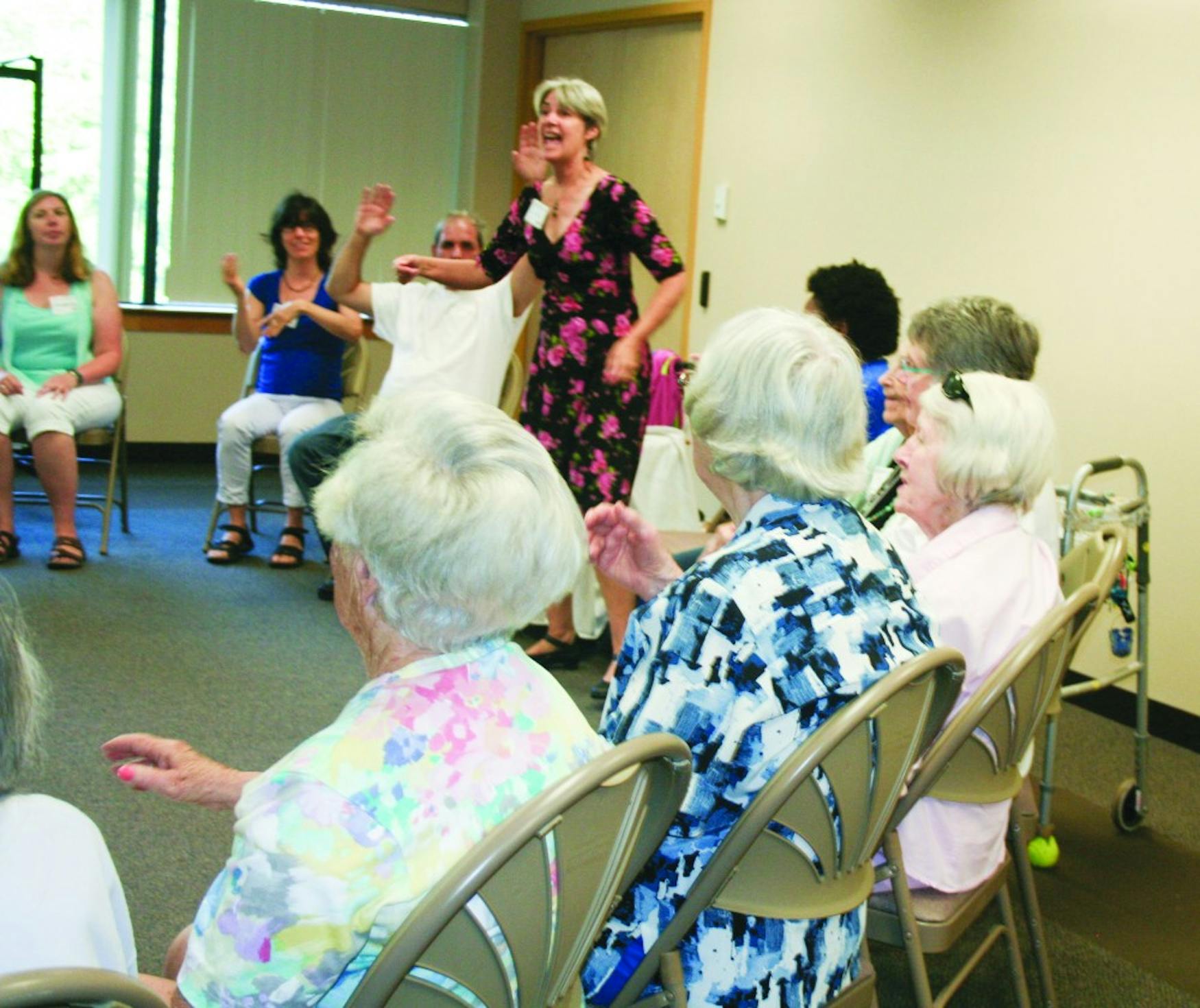Trip down memory lane
Usually, when you sit down to talk with a friend, you can be sure that he or she will look you in the eye and, with no hesitation, talk about the one day that made his or her past summer so special.
But when you talk to someone who has endured memory change due to a debilitating disease like Alzheimer’s disease or Parkinson’s disease, you expect something different. The conversation stalls because your companion often loses his or her train of thought. You find that you need to dictate the conversation.
Companions to Elders is one of the 19 programs administered by the Waltham Group, Brandeis’ community service umbrella organization. Beginning last spring, the program’s coordinators, Matt Chamberlain ’15, Linda Nakagawa ’15 and Melanie Gomes ’16 formed a partnership with Jewish Family and Children’s Services in Waltham. Once a month, Brandeis students volunteer at the JF&CS facility and befriend those who suffer from memory change.
“Our mission is to connect students with older populations in the area who require assisted living,” said Chamberlain. He observed that for those who suffer from Alzheimer’s or other related diseases, talking with someone younger can stimulate their memories, which they may otherwise have difficulty doing on their own.
Jewish Family and Children’s Service provides the venue to make this interaction possible. Beth Soltzberg, a program coordinator at JF&CS, appreciates the companionship that Brandeis volunteers offer to those with significant memory changes. “People with Alzheimer’s or other diseases that cause dementia tend to find that their world gets smaller and smaller, and they’re not able to do things they used to do, and they become very isolated. Isolation then leads to depression. We at JF&CS aim to intervene in that process,” Soltzberg said.
This past March, JF&CS began coordinating Memory Cafés, events that are designed to give those who experience memory change both company and comfort in an authentic social environment.
“Memory Cafés are unlike receiving professional treatment and rehabilitation, and they are also unlike a visit to Starbucks where the baristas know nothing about you,” Soltzberg said.
“In fact, the experience is like a combination of the two. Professionals from all over the region drop by, and it’s wonderful to have the presence of professionals and student volunteers because it makes it feel like the crowd one might find at Starbucks.” This past Friday, JF&CS hosted its seventh Café.
“Memory Cafés are a relatively new idea catching on around the country,” Chamberlain wrote in an email to the Justice. “They are a great place for people with memory disorders, diagnosed or undiagnosed, to chat with one another and have engaging conversations in a stigma free environment.”
The appearance of Memory Cafés across the United States marks a recent trend that has been steadily gaining momentum since the early 2000s. The idea originally took shape in the Netherlands in 1997 thanks to the work of Dr. Bere Miesen, and the cafés have gradually spread to other parts of the globe.
Soltzberg explains that the cafés held at JF&CS place emphasis on the creative arts. “Core arts represent a big part of what we do here. Sometimes we offer dance groups for those with Parkinson’s, and we also entertain singers, poets and visual artists who incorporate the café’s guests into their routine.” This past Friday, JF&CS hosted a dance instructor who encouraged the café’s guests to be physically active.
The partners of those who have experienced significant memory change are also negatively affected yet in less obvious ways. The attention that JF&CS devotes to the entire family and not simply the family member affected by memory change is an important aspect of the program. “Like those who endure significant memory change, their partners may also feel isolated and often focus on what is going wrong,” Soltzberg said.
“The Memory Cafés are tailored to emphasize what is going right; they tend to bring out the best traits in the partner who experiences memory change,” she said. Soltzberg also notes that JF&CS provides guidance to family members who are not affected on how to make the best of their living environment.
Student volunteers play a particularly important role at the Memory Cafes. “Talking to students gives the elderly a chance to give advice, which is an honored role that many do not get a chance to play at this stage in their lives,” Soltzberg said.
Chamberlain notes that this dynamic between students and those with memory disorders makes for a memorable experience. “So far we’ve found that the attendees really enjoy the presence of Brandeis students.”
The roles of volunteers include setting up and greeting the arriving guests, actively participating in discussion with them and participating in activities such as poetry, music and dancing. “It’s such a pleasure to go and connect with familiar faces,” said Chamberlain.
Those who have endured memory change can also take advantage of students’ company by comparing their personal experiences to those of the students. Soltzberg recalls the very first Memory Café that hosted student volunteers.
“We got together not long after Pete Seeger passed away and we had a performer come and sing a few of his songs,” Soltzberg said.
“We watched a video of Seeger performing in the late ’50s on a college campus, and it was really fun after watching that to listen to the guests say to the Brandeis students, ‘Is this what it looks like on campus now?’”
Equally as important as the benefits reaped by those suffering from disease, student volunteers also benefit from the experience at a Memory Café.
Soltzberg recognizes that volunteers who attend the café are likely, at some point in their lives, to sustain a relationship with someone with memory change. “Giving students this exposure,” Soltzberg said, “will provide them with valuable know-how so that they are equipped to handle a relationship with someone close to them with memory changes in a positive way later in life.”




Please note All comments are eligible for publication in The Justice.